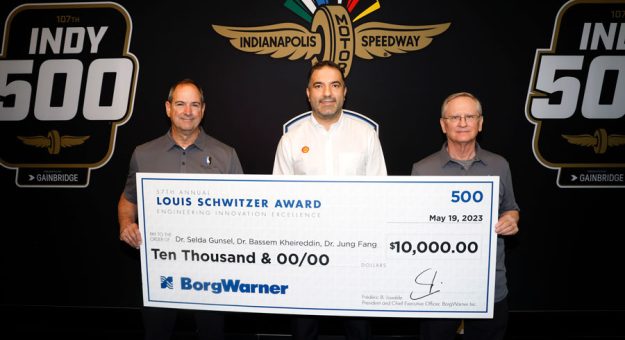INDIANAPOLIS — Three engineers who are involved in Shell’s 100 percent renewable race fuel that is used in the NTT IndyCar Series are this year’s recipients of the Louis Schwitzer Award at the Indianapolis 500.
Selda Gunsel, Ph.D., Bassem Kheireddin, Ph.D. and Jung Fang, Ph.D. received the 57th annual award on Friday at Indianapolis Motor Speedway. The 57th Lous Schwitzer Award celebrates engineers behind the technologies powering IndyCar Series race cars.
It is presented by BorgWarner and the Indiana Section of the Society of Automotive Engineers (SAE) International.
Gunsel, Kheireddin and Fang received the $10,000 prize, which will be donated to charity.
The new Shell Race Fuel is 100 percent renewable, utilizing second generation ethanol combined with a proprietary blend of non-fossil fuel.
The ethanol is derived from sugarcane waste and is blended with another waste-based renewable component to create race fuel that meets the demanding needs of IndyCar engines. The fuel enables at least 60 percent greenhouse gas emissions reduction compared to fossil-based gasoline. Shell developed this fuel as a drop-in replacement with identical performance and durability.
“It’s an honor to be a part of the Louis Schwitzer Award selection committee and have the chance to take a deep dive into the engineering teams that bring NTT IndyCar Series innovations to life,” said James Wood, chief engineer at BorgWarner’s Noblesville, Ind., facility. “At BorgWarner, we are working daily to decrease our carbon footprint and we commend this team for creating a fuel that is 100 percent renewable, eco-friendly and delivers the same performance and durability as the fuels it’s replacing.”
The annual Louis Schwitzer Award is presented to engineers by engineers, celebrating the individuals behind the innovative concepts introduced to the motorsport industry that increase competitive potential, meet NTT IndyCar Series specifications, and are related to the vehicle’s engine, powertrain, profile, chassis or safety.
Established in 1967, the award commemorates the spirit of Louis Schwitzer, who won the first auto race at IMS in 1909, led the IMS technical committee and founded the Schwitzer Corporation, which was acquired by BorgWarner in 1999.
Steve Holman, Chairman, Louis Schwitzer Award Committee of the Indiana Section of SAE International presented the award and spoke of the importance of Shell’s 100 percent renewable fuel.
“We feel this award is so important because there’s a lot of people that would like to just flip the switch and maybe within 10 years, we’ll all be moving everything with electrons powered by the sun, but it’s just not going to be that easy because liquid fuels have tremendous advantage in what’s called energy density,” Holman explained. “There are just certain applications you can’t, with any current electrical battery technology, meet.
“The race cars, we had a great example from one of our engine engineers. He had a similar question, so he said, I went back to my calculator and made a couple calculations, and he said to run the Indy 500 for one car, 500 miles, would take 80,000 pounds of lithium-ion batteries, and there’s similar applications.
“Airplanes, there’s a lot of work going on in what’s called SAF, sustainable aviation fuel. Liquid fuels have their place for quite some time. There’s a possibility that sometime in the future people are going to look back at this and say, hey, that’s another rear-view mirror. It’s that kind of advancement that we need to have to get our total mobility solutions available to humans in the future.”
Kheireddin spoke about the importance of being recognized for Shell’s tremendous gains in renewable fuels.
“It’s truly a great honor to be here and accept the Louis Schwitzer Award on behalf of Shell today,” Kheireddin said. “As an engineer myself, this award means a lot to me because it recognizes innovation, excellence, and pushing boundaries in automotive engineering, and that’s what racing is all about.
“I’m deeply grateful for Steven, the selection committee for bestowing this great honor on our Shell team for the 100 percent renewable race fuel. I’d also like to thank SAE International, the Indiana section, BorgWarner for recognizing and fostering this period of innovation, and their commitment to improving and building on automotive engineering and advancing technology and breakthroughs.
“Obviously this work doesn’t happen without the effort of many, so I’d also like to thank my Shell colleagues and teammates.”
Progress is being made in reducing the carbon footprint, but electric technology on a large and competitive scale are simply years away from becoming a reality.
“We’ve spent countless hours tackling the challenges on this journey,” Kheireddin said. “I won’t go into the details, but as Steven said, the greatest testament that I’ve ever received from this project is the feedback from the racing engineers and the drivers that this was indeed a drop-in solution without any required modification to the engines.
“Our 100 percent renewal race fuel is the latest example of how pushing the boundaries on the race track can benefit our customers around the world and in the future.
“With that said, innovation doesn’t happen in isolation. Working alongside motorsports, racing engineers from Ilmor Engineering, Chevy, Honda, IndyCar, is really one of several avenues that Shell leverages to demonstrate and create broader awareness of what low carbon fuel technologies are about and how we can transfer those learnings into future fuel development.
“Once again, thank you to the committee on this tremendous honor from the Shell team.
“What I would add to that is the demanding needs of an IndyCar engine are different than those of a road car. But the key thing for motorsports is it’s a platform so that the technology that we use in that fuel, for example, can be transferred to a road fuel.
“So, we’re not entirely there yet, but I can guarantee you that it will come.”
